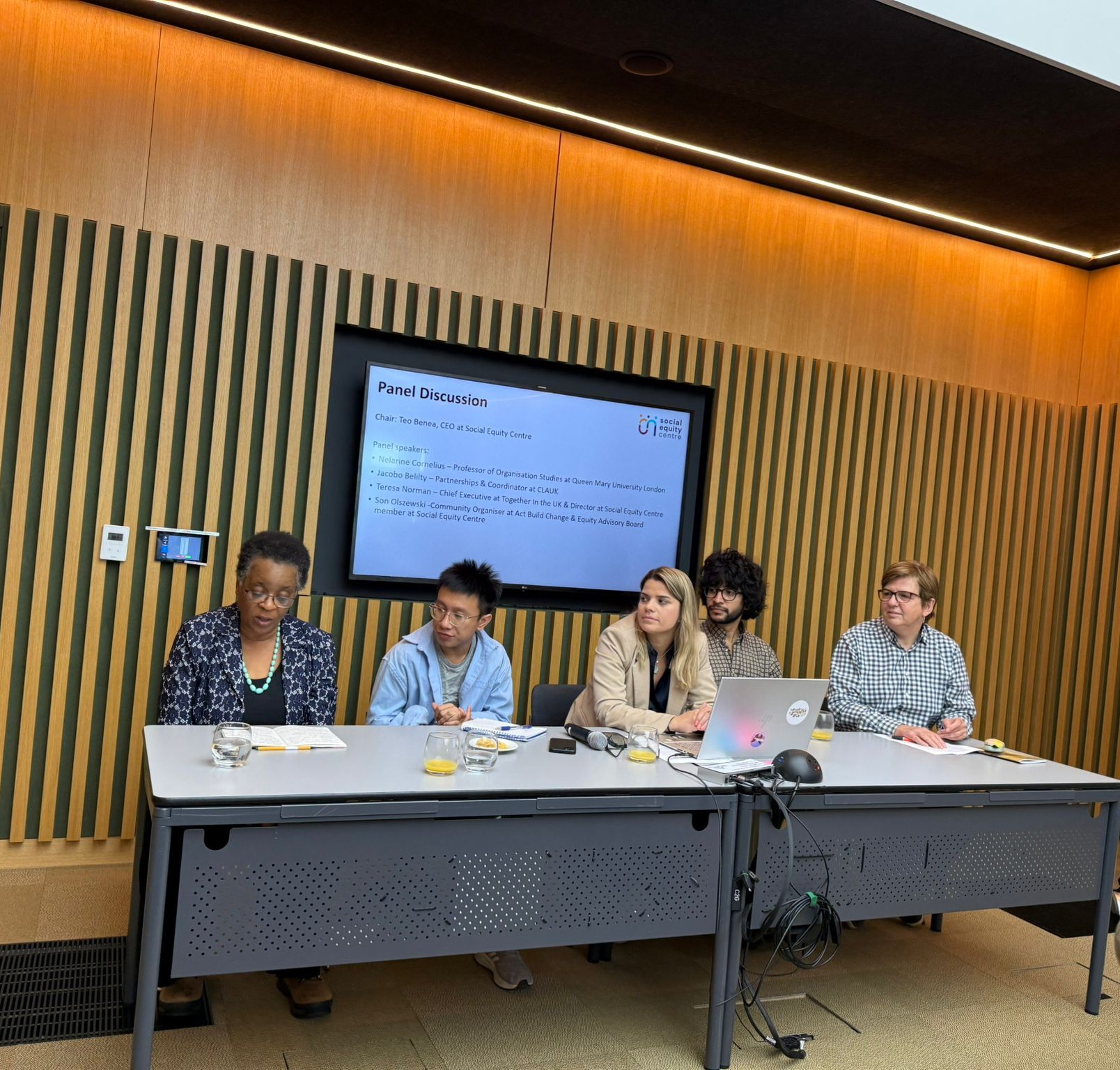Report Launch: Migrant Representation in UK Local Government Workforces: Advancing Justice and Participation for Equitable Governance

On Friday, 23rd May 2025, the Social Equity Centre launched its first ground-breaking report:
“Migrant Representation in UK Local Government Workforces: Advancing Justice and Participation for Equitable Governance” at London’s City Hall.
The report, funded by the Paul Hamlyn Foundation, was co-authored by Adina Maglan, Executive Director & Co-founder of the Social Equity Centre, and Dr. David Tross, from Birkbeck University. It presents a compelling case for why representation of first-generation migrants in local government matters—not only as a matter of fairness, but as a fundamental aspect of democratic, effective, and equitable governance.
Welcome: This Report is a Challenge and an Invitation
The event opened with a welcome speech from Teo Benea, CEO & Co-founder of the Social Equity Centre, who reminded attendees of the report’s urgency and importance.
“Despite some progress on workforce diversity, migrants remain largely invisible within the system. Representation matters—not just in numbers, but in power, participation, and influence.”
She highlighted a stark finding from the report: out of the six local governments reviewed, only one collected data on the nationality or migration status of their workforce. This is in sharp contrast with the UK population, where 16% of residents—and 40% of Londoners—were born outside the UK.
Teo underlined that the report is not just about identifying gaps, but about providing pathways forward, supporting migrant-led solutions, and making the case for long-term policy reform.

Report Presentation: Migrants Are Not Missing – They’re Being Overlooked
Adina Maglan and Dr. David Tross then presented the research findings, drawing from a mix of workforce data analysis, public records and a qualitative national survey.
Key findings from the report include:
- Lack of data collection on migration background makes migrant staff 'statistically invisible'
- Migrants face a triple bind of underrepresentation, exclusion, and limited progression
- Reports of tokenism and unequal treatment remain common
Despite these barriers, the report is not without hope. It showcases examples of good practice, including councils that are proactively working on equity audits, inclusive recruitment, and community leadership pathways.
'This report makes it clear: first-generation migrants are ready and willing to serve their communities. The real question is—are local institutions ready to include them?' – Adina Maglan


Call to Action
Lastly, Adina Maglan introduced Social Equity Centre’s Migrant Inclusive Local Government Pledge designed to assist Local Government organisations in progressing their migrant inclusion work, with a commitment from signatory authorities to:
- Take steps towards improving collecting, analysing, and reporting on their workforce diversity to include migration and ethnicity more comprehensively and to reflect their local populations
- Develop specific recruitment strategies or enhance their existing ones to highlight the need for migrant inclusion
- Create and implement action plans to engage with local migrant groups and community organisations to promote job vacancies in their organisation
Social Equity Centre can support Local Governments by assisting them in developing their migrant-inclusive recruitment strategies, contributing to research, and providing our bespoke Local Government Career Training Programme to migrant residents to enhance their skills and employability in the sector.

Discussion: Breaking Down Barriers
The second half of the morning featured an insightful panel discussion, with contributions from:
- Professor Nelarine Cornelius, Queen Mary University London
- Jacobo Belilty, Partnerships & Coordinator at CLAUK
- Teresa Norman, Chief Executive at Together in the UK & Director, Social Equity Centre
- Son Olszewski, Community Organiser at Act Build Change & Equity Advisory Board Member at Social Equity Centre
Each speaker was invited to answer three critical questions based on the report’s findings:
- Beyond access to employment, what other barriers do migrants face and how can local councils actively dismantle them?
- What concrete policy changes are needed to remove systemic barriers?
- How can workforce diversity monitoring become standard and resourced across all councils?
The panel offered a range of perspectives—from academic analysis and grassroots organising to strategic policy recommendations. Common threads emerged: the need for better data, the importance of local government accountability, and the value of migrant leadership in shaping solutions.

Q&A and Closing Remarks
A lively Q&A followed, with attendees discussing implementation challenges, the importance of political will, and how to turn research into policy change.
Teo Benea returned to offer closing remarks and thanked everyone for coming.

Next Steps and Where to Read the Report
We encourage everyone working in local government, the public sector, or civil society to explore the report in full. It includes 11 detailed recommendations, such as:
- Implementing migration-aware recruitment and progression practices
- Embedding migrant-inclusive data collection in HR systems
- Strengthening partnerships between councils and migrant-led organisations
- Adopting a Public Sector Duty to Represent, modelled on the Equality Duty
📘 Both the full report and the summary report are available here:
👉https://www.socialequity.org.uk/research
With Gratitude
We’re grateful to Paul Hamlyn Foundation for funding this research. A special thanks also goes to Sarah Pinch, member of the Equity Advisory Board, and Teresa Norman, Director at the Social Equity Centre, for their insightful contributions and feedback on the report.
Final Thoughts
This launch was more than an event—it was a call to action. To ensure that local government reflects the rich diversity of the communities it serves, first-generation migrants must be visible, included, and empowered.
#MigrantRepresentation #EquityInGovernment#SocialEquityCentre #InclusiveWorkforce #PublicSectorReform #PolicyChange#DataMatters #RepresentationMatters










